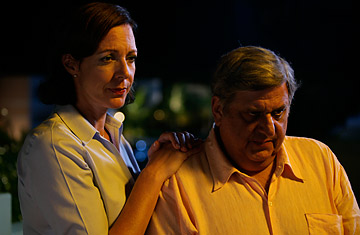
Allison Janney as Trish and Michael Lerner as Harvey in Life During Wartime directed by Todd Solondz
(2 of 2)
As in Happiness, the focal family situation involves Bill, Trish and their kids. Bill, just released from prison, wants to reconnect with his sons to see if they're cursed with his proclivities. Trish, relocating to Florida with her two younger kids, has fallen in love with the stolid Harvey (Michael Lerner), whose need to keep secrets is one of the things she finds most attractive about him. (He: "I can't talk about my sex life." She: "I can't talk about mine either." He: "There's so much I don't understand." She: "Sometimes it's better not to understand.") She obviously thinks that of Timmy, to whom she lied about Bill. "I wanted you to grow up free and happy," she gently explains, "as if he were dead." Their conversations are as taught and fraught as any mother-son chats, with the added toxicity of Bill's criminal disease. Trish tells Timmy that if any man ever touches him, even by accident, "You scream."
To clue you into the squirmy-eloquent, sad-funny tone of a Solondz film, here's a two-minute exchange, in a hotel cocktail lounge, between two strangers sizing each other up and wondering whether to spend the night together. The woman is Jacqueline — Charlotte Rampling, the great Anglo-vixen from 45 years of European films, now splendidly weathered, still in full command of her sexual authority — and the man is Bill. Read the dialogue the way it is delivered, drily, thoughtfully, as the dialogue of two specters who might have just met in an antechamber of Hell:
Jacqueline: Mind if I join you?
Bill: Please.
Jacqueline: Forgive me — please tell me you're straight.
Bill: I am.
Jacqueline: Oh, thank God. (Sips her drink.) So what are you doing here all alone?
Bill: Work.
Jacqueline: You like your work?
Bill: It pays.
Jacqueline: Good. Then we don't have to talk about it.
Bill: Are you alone?
Jacqueline: Married. Alone. The same thing.
Bill: No. Alone is alone.
Jacqueline: I'm good at reading people, y' know.
Bill: What do you read now?
Jacqueline: Well, I see a man. And he's alone. And he's straight. That's good enough for me.
Bill: You are good.
Jacqueline: My husband was a fag.
Bill: Must have been hard.
Jacqueline: Only man I ever loved.
Bill: What happened to him?
Jacqueline: Stove.
Bill: Any kids?
Jacqueline: Not anymore. Just a pack of wolves. And they're out for blood.
Bill: How so?
Jacqueline: They've decided I'm the villain — I'm a monster
Bill: Why do they think that?
Jacqueline: 'Cause I am a monster.
Bill: People can't help it if they're monsters.
Jacqueline: They can't be forgiven either.
Bill: Have you asked for forgiveness?
Jacqueline: I'm not a fool. If I were them, I wouldn't forgive me either. In my family, there are only winners and losers.
Bill: And only losers ask for forgiveness...
Jacqueline: Only losers expect to get it.
Forgive and forget: that's the theme of Life During Wartime, which is haunted by the ghosts of Happiness. Billy, meeting his father years after he disappeared, says of his mother, "She told everybody you were dead," and Bill glumly replies, "Well, she was right." His son says, "It's good you were dead"; his sense of abandonment from his loving, twisted father has turned to rancor. But Timmy, now the age Billy was in the first film, wants to connect with Bill. At the end, he cries out, "I don't care about freedom and democracy. I just want my father." As he speaks, Bill's image briefly materializes on the other side of the street, and vanishes.
John Irving said that, in writing a novel, he tried to create the nicest people, then imagine the most awful things that could happen to them. Solondz dreams up people who do awful things, then imagines what it's like to be them. He doesn't want to judge his characters; he needs to understand them. And because he portrays them with such boldness and acuity — daring the viewer to laugh at them and, a bigger challenge, to find some residue of beauty in the beasts — he is the best argument for why we need indie movies. His films will never be mainstream fare; audiences who wander into the theater may well find them derisive, needlessly shocking, perhaps unforgivable. But I'd call them, and especially Life During Wartime, unforgettable.
